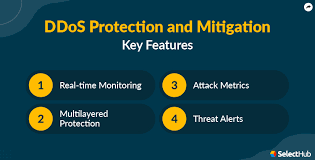Countering Extortion: The Power of Managed DDoS Protection
In the perilous landscape of cyber threats, Distributed Denial of Service (DDoS) attacks pose a severe risk to businesses.
This article explores how Managed DDoS Protection fortifies digital landscapes for uninterrupted online operations.
Introduction
In the digital era, businesses face cyber threats, particularly DDoS attacks. This article explores proactive steps using Managed DDoS Protection.
Understanding DDoS Extortion
DDoS extortion involves malicious actors flooding a targeted online service with overwhelming traffic, rendering it inaccessible to legitimate users. These attacks often come with extortion demands, threatening extended disruptions unless a ransom is paid. Managed DDoS Protection serves as a formidable defense against such threats.
The Power of Managed DDoS Protection
- Proactive Threat Mitigation: Managed DDoS Protection proactively identifies and mitigates threats pre-impact. This approach ensures that businesses are one step ahead of potential attackers.
- Continuous Monitoring and Analysis: An effective Managed DDoS Protection service continuously monitors network traffic, analyzing patterns and anomalies in real-time. This vigilant oversight enables swift detection and response to potential DDoS threats.
- Scalable Defense Mechanisms: The scalability of Managed DDoS Protection allows businesses to adapt their defense mechanisms based on the evolving nature and intensity of DDoS attacks. This ensures a robust defense against both small-scale and large-scale threats.
The Impact of DDoS Attacks
- Business Disruption: DDoS attacks can cripple online services, leading to significant business disruptions. Managed DDoS Protection acts as a shield, preventing such disruptions and ensuring continuous online availability.
- Reputation Damage: Extended downtime due to DDoS attacks can tarnish a business’s reputation. By investing in Managed DDoS Protection, organizations can safeguard their online image and maintain the trust of their users.
Elements of Effective Managed DDoS Protection
- Traffic Scrubbing: Managed DDoS Protection employs advanced traffic scrubbing techniques to filter out malicious traffic while allowing legitimate traffic to reach its destination. This ensures that online services remain accessible to genuine users.
- Anomaly Detection and Mitigation: Automated anomaly detection algorithms in DDoS Protection systems identify irregular patterns in network traffic and initiate prompt mitigation measures, minimizing the impact of potential attacks.
- 24/7 Security Operations Center (SOC): A dedicated 24/7 Security Operations Center ensures constant surveillance and response to emerging threats. This proactive approach is instrumental in maintaining the integrity of online services.
Collaboration with DDoS Protection Providers
Tailored Protection Plans
Managed DDoS providers recognize that every business is unique, with its own set of needs and vulnerabilities. Consequently, they offer tailored protection plans that align with the specific requirements of each business. This customized approach ensures that businesses receive optimal protection against potential DDoS threats.
Tailored protection plans involve a comprehensive analysis of a business’s infrastructure, network architecture, and potential points of vulnerability. By understanding the intricacies of a particular business, DDoS Protection providers can implement measures that precisely address the risks and potential attack vectors that the business may face.
The significance of tailored protection plans lies in their ability to provide a nuanced defense strategy. Instead of employing a one-size-fits-all approach, businesses benefit from security measures designed to address their unique challenges, making it more difficult for attackers to exploit vulnerabilities.
Regular Security Audits
Periodic security audits form a critical component of an effective Managed DDoS strategy. These audits are conducted by DDoS Protection providers to proactively identify and address potential vulnerabilities before they can be exploited by attackers.
During a security audit, the provider examines the existing security infrastructure, assesses the effectiveness of current protection measures, and identifies any potential weaknesses.
By staying ahead of emerging threats, businesses can fortify their defenses and ensure that protection measures are continuously updated to match the evolving tactics employed by DDoS attackers.
Security audits serve as a preemptive strike against potential DDoS threats, enabling businesses to plug any security gaps before they can be exploited. This proactive approach is essential for maintaining a robust defense posture in the ever-changing landscape of cybersecurity.
Business Continuity and Risk Mitigation
Ensuring Uninterrupted Operations
One of the primary objectives of DDoS Protection is to ensure uninterrupted business operations, even in the face of DDoS attacks.
Downtime resulting from such attacks can have severe consequences, including loss of revenue, damage to reputation, and decreased customer trust.
Managed DDoS Protection deploys advanced mitigation techniques to absorb and deflect the malicious traffic generated by DDoS attacks.
By doing so, it ensures that a business’s online services remain accessible to legitimate users, contributing to overall business continuity and resilience.
Mitigating Financial Risks
DDoS attacks can have a significant financial impact on businesses.
The potential revenue loss associated with downtime, coupled with the financial strain of potential extortion payments demanded by attackers, underscores the need for robust protection.
DDoS Protection acts as a financial safeguard by preventing prolonged downtime and minimizing the financial risks associated with DDoS attacks.
By ensuring continuous online availability, businesses can mitigate the potential economic fallout of these attacks and maintain financial stability.
In conclusion, the tailored protection plans, regular security audits, and contributions to business continuity and risk mitigation by Managed DDoS Protection providers play a crucial role in enhancing the cybersecurity posture of businesses.
These measures not only fortify defenses against DDoS threats but also contribute to the overall resilience and sustainability of businesses in the digital landscape.
Conclusion
In conclusion, the proactive defense against DDoS extortion is paramount in safeguarding businesses from disruptive cyber threats.
Managed DDoS stands as a robust and adaptive solution, offering continuous monitoring, scalable defense mechanisms, and collaborative efforts with protection providers.
By investing in Managed DDoS Protection, businesses can fortify their digital presence and ensure the uninterrupted delivery of online services.

